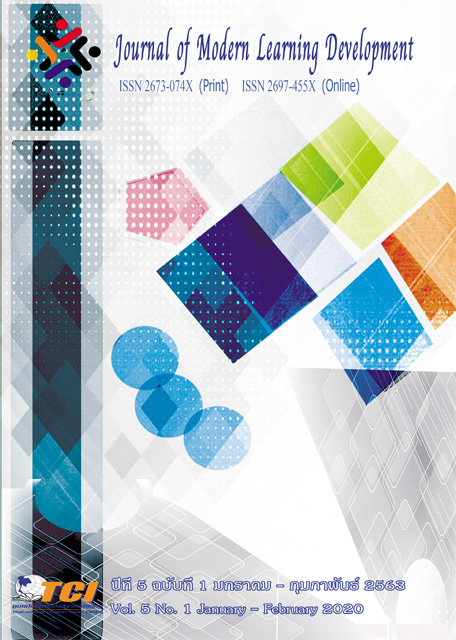Learning Management in Social Studies, Religion and Culture areas Based on Concentration to Promote Higher Secondary Students’ Learning Skill of Muaengkalasin School Kalasin Province
Main Article Content
Abstract
The aims of this research were:to study the conditions of learning management, learning management models and to propose a model and guideline for learning management in social studies, religion, and culture by using meditation as a base to promote learning skills of upper secondary school students in MueangKalasin school, Kalasin province. The sample group consisted of 189 high school students, grades 4-6 and the target group were one school administrator and 4 teachers. This study was carried out by using the mixed research method including quantitative and qualitative research.
The research results were as follows:
The learning management in social studies, religion, and culture by using meditation as a base to promote learning skills of upper secondary school students in MueangKalasinschool, Kalasin province in all six aspects in overall was rated at a high level of practice. The aspect that had the highest mean was the activity, followed by the application of the Dhamma in the way of life, learning summary, learning preparation, learning exchanges and assessments.
The model of the learning management in social studies, religion, and culture by using meditation as a base was that the preparation for study is to meditate or find activities to gain meditation before learning, creating content that focuses on learners to learn, good planning in advance. Before accessing the content of the study, activities were planned in advance, applying the Buddhist principles in the planning of learning management. There is the use of modern teaching and learning activities both electronic media, activities with imagination to make the classroom environment interesting. There is an exchange of knowledge between students and teachers as a base for learning, organizing teaching and learning that causes students to concentrate and raise their wisdom. There are knowledge reviews and opportunities provided for learners to learn both in the classroom and outside of the classroom, making the students apply the knowledge to their daily lives, teaching concentration principles that will make the learners understand the learning. There are various learning processes both learning and learning evaluation and the use of meditation as a link in the assessment of student performance.
The guidelines for learning management in social studies, religion and culture by using meditation as the base are that the course content should be prepared to suit the students. It should emphasize on benefits that can be applied in everyday life and has been integrated in accordance with the basic knowledge and needs of students by focusing on meditation as a base to provide opportunities for learners to participate in teaching and learning activities. This includes the activities or creating an atmosphere in teaching and learning to learn with concentration. There should find a variety of modern teaching techniques and methods, including the application of teaching media and the content of teaching and learning that is suitable for the basic knowledge and age of the learners. The teachers should allow students to participate in the comments in the course or summary of instruction in order to be a part of the learners and be an agreement in the classroom. The plan of learning management that learners can apply the knowledge in daily life should be made appropriately. There should be a variety of measurements and evaluations along with following up and evaluating results for analysis, improvement for the best benefit of the learners.
Article Details
References
นวพร ชลารักษ์. (2558). บทบาทของครูกับการเรียนการสอนในศตวรรษที่ 21.วารสารวิชาการมหาวิทยาลัยฟาร์อีสเทอร์น, 9 (1), 64-71.
พระกฤษณะวชิรญาโณ (วภักดิ์เพชร). (2560). การจัดการเรียนการสอนกลุ่มสาระสังคมศึกษา ศาสนา และวัฒนธรรมในการส่งเสริมคุณธรรมจริยธรรมแก่นักเรียนมัธยมศึกษาตอนปลาย ในเขตเทศบาลนครอุดรธานี. พุทธศาสตรมหาบัณฑิต สาขาวิชาการสอนสังคมศึกษา. บัณฑิตวิทยาลัย : มหาวิทยาลัยมหาจุฬาลงกรณราชวิทยาลัย.
พระปลัดสาธิต อมโร (จินดารอง). (2558). ศึกษาการจัดการเรียนการสอนวิชาพระพุทธศาสนาในโรงเรียนประถมศึกษาปีที่ 6 เขตบางคอแหลม สังกัดกรุงเทพมหานคร. พุทธศาสตรมหาบัณฑิต สาขาวิชาการสอนสังคมศึกษา. บัณฑิตวิทยาลัย: มหาวิทยาลัยมหาจุฬาลงกรณราชวิทยาลัย.
พระมหานิพิฐพนธ์ จิรวฑฺฒโน (วงศ์อนุ). (2560). การจัดการเรียนรู้เพื่อพัฒนาผู้เรียนด้านจริยธรรมในการเรียนสาระสังคมศึกษาศาสนา และวัฒนธรรม ระดับมัธยมศึกษาตอนปลาย อำเภอเมือง จังหวัดหนองคาย. พุทธศาสตรมหาบัณฑิต สาขาวิชาการสอนสังคมศึกษา. บัณฑิตวิทยาลัย: มหาวิทยาลัยมหาจุฬาลงกรณราชวิทยาลัย.
มาลีวัล เลิศสำครศิริ. (2559). ประสิทธิผลของโปรแกรมการฝึกสมาธิ ต่อพหุปัญญาของนักศึกษาชั้นปีที่ 1 วิทยาลัยเซนต์หลุยส์. วารสารพยาบาลทหารบก, 17 (3), 44-53.
วิภาพรรณ พินลา. (2560). แนวทางการจัดการเรียนรู้วิชาสังคมศึกษา เพื่อพัฒนาทักษะการคิดอย่างมีวิจารณญาณสำหรับผู้เรียนในศตวรรษที่ 21. รายงานวิจัย สาขาการสอนศิลปศาสตร์ การสอนสังคมศึกษา. คณะศึกษาศาสตร์มหาวิทยาลัย :ทักษิณ.
ศุกร์ใจ เจริญสุข, เพ็ญพรรณ พิทักษ์สงคราม และไมเคิล คริสโตเฟอร์. (2558). ความหมายและปัจจัยบ่มเพาะสติจากประสบการณ์ของสตรีไทยที่ปฏิบัติธรรม. วารสารพยาบาลกระทรวงสาธารณสุข, 25 (3), 170-183.
ศุภวรรณ ธนุภาพรังสรรค์ และมาลีวัล เลิศสาครศิริ. (2558). ผลของการใช้รูปแบบการฝึกสมาธิโดยบูรณาการสติปัฏฐาน 4 กับเอสเคที 1 ต่อความสามารถทางสมอง ความตระหนักรู้ในตนเองและสัมฤทธิผลทางการเรียนของนักศึกษาพยาบาล. วารสารพยาบาลสงขลานครินทร์, 36 (Supplement), 13-28.


